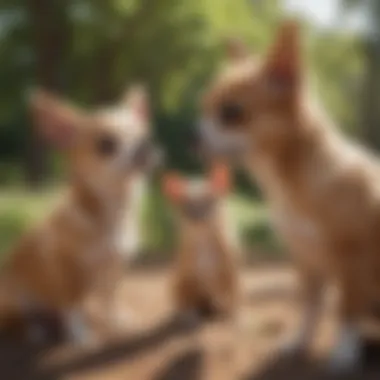The Charismatic World of Adorable Chihuahuas: A Detailed Guide


Intro
Chihuahuas are more than just tiny dogs. These small companions boast a rich history and a unique personality. Understanding their behaviors, characteristics, and care needs is essential for anyone considering adopting one. This article provides insights into the world of Chihuahuas, offering a detailed exploration of their origins, traits, care tips, and training advice for an enjoyable companionship.
Animal Overview
Common Name and Scientific Classification
Chihuahuas are one of the smallest dog breeds, known scientifically as Canis lupus familiaris. This breed is often identified by its lively spirit and affectionate nature. The name derives from the Mexican state of Chihuahua, where this breed is believed to have originated.
Physical Characteristics
The Chihuahua's physical features are charming. They typically weigh between two to six pounds. Their small stature is complemented by large, expressive eyes and erect ears. The coat can be either short-haired or long-haired, available in various colors including fawn, black, and white. Despite their tiny size, Chihuahuas possess a confident demeanor that often surprises new owners.
Habitat and Distribution
Chihuahuas thrive in various environments, adapting well to both urban apartments and rural homes. Originally bred in warm climates, they enjoy moderate temperatures but can adapt to cooler environments with appropriate care. Their popularity has spread globally, making them common companions in households worldwide.
Behavior and Social Structure
Communication Methods
Chihuahuas express themselves through a variety of vocalizations, including barks, growls, and yips. Their body language also conveys emotions; a wagging tail often indicates happiness, while a tucked tail may suggest fear or submission.
Social Hierarchies
Though small, Chihuahuas can exhibit complex social behaviors. They often form strong bonds with their owners and can be protective of them. Socialization with other pets and people is crucial, as it helps them develop confidence and proper social skills.
Mating and Reproductive Behavior
Chihuahuas reach sexual maturity around six months. Breeding these dogs should be approached with caution due to health risks associated with their small stature. Responsible breeding practices are essential for maintaining the health and characteristics of the breed.
Common Health Concerns
Chihuahuas may face certain health issues. These can include dental problems due to their small mouths, heart conditions, and patellar luxation. Regular vet check-ups are important. Keeping an eye on their diet and exercise can help prevent obesity, a common concern with this breed.
Care and Maintenance
Understanding the care needs of Chihuahuas is essential for any owner. They require regular exercise, mental stimulation, and social interaction. Training can be done using positive reinforcement techniques. A well-trained Chihuahua not only enhances the bond between the pet and owner but also promotes good behavior.
Important: Regular dental care is crucial for Chihuahuas. Their small mouths can lead to dental issues if not properly managed.
Epilogue
In summary, Chihuahuas offer both joys and challenges to their owners. Their unique personality and behaviors make them special companions, while understanding their needs ensures a healthy and fulfilling relationship. Potential owners should consider the information provided to make informed decisions about welcoming a Chihuahua into their lives.
Foreword to Chihuahuas
Chihuahuas are not just a breed; they are a phenomenon. Their small stature and vibrant personalities make them intriguing companions. Understanding Chihuahuas is crucial for any potential owner or enthusiast. This section sets the stage for delving deeper into aspects such as breed overview, appearance, behavior, and care. Knowing about these dogs is not only beneficial for ownership but also provides insight into their unique characteristics and needs.
Breed Overview
The Chihuahua, often seen as a toy dog, is among the smallest dog breeds in the world. Typically, they weigh between two and six pounds, but they carry a confident and assertive demeanor. Their small size, however, does not diminish their vibrant personality. Chihuahuas are known for their loyalty and attachment to their owners. They often form strong bonds and can be quite protective. Their temperaments vary from playful and affectionate to more reserved, depending on individual upbringing and socialization.
Chihuahua's Unique Appearance
Chihuahuas come with a distinct look that is often quite appealing. Their features and build contribute significantly to their charm.
Size Variability
The size variability of Chihuahuas is one of their defining characteristics. They can be classified as either standard or teacup Chihuahuas. This aspect helps appeal to a wide audience since potential owners may prefer a smaller companion. For those considering placement in an apartment or smaller living spaces, their diminutive size is an advantage. However, it's essential to be cautious about health risks associated with breeding smaller varieties.


Coat Types
Coat types also play an important role in a Chihuahua’s appearance. There are two main types: short coat and long coat. The short-coated Chihuahuas have sleek fur, requiring less grooming than their long-haired counterparts. Long-coated Chihuahuas, although they may need more grooming, offer a different aesthetic appeal. Both types come in a variety of colors and patterns, enhancing their visual diversity. Potential owners can choose based on personal preference and lifestyle compatibility.
Facial Features
Facial features are another significant aspect of the Chihuahua’s appeal. They often have large, expressive eyes and a rounded head, which create an endearing look. These features contribute to their charm and ability to connect with humans. A Chihuahua's facial expression can convey a range of emotions, making them more relatable. However, some face shapes can predispose them to specific health issues, thus requiring attentive care.
Understanding the unique traits of Chihuahuas enhances the experience for both owner and pet.
In exploring these aspects, one gains a comprehensive view of what it means to engage with this breed. The combination of size variability, coat types, and facial features encapsulates why Chihuahuas hold a special place among dog lovers.
Historical Background
Understanding the historical background of Chihuahuas adds depth to our appreciation of this breed. It reveals not just where they come from but also how their rich history shapes their present behaviors and characteristics. The Chihuahuan roots dive deep into pre-Columbian times and ancient civilizations, which makes their story fascinating and worth exploring. This section will address these origins and how they influence the breed we know today.
Origin Theories
Pre-Columbian Roots
Pre-Columbian roots of Chihuahuas trace back to ancient civilizations. They are believed to have been companions to the Toltec people, who revered these small dogs. Their small size and affectionate nature made them ideal pets in the pre-Columbian society. This historical connection highlights the bond between humans and dogs that has existed for centuries.
Key characteristic of this theory includes the notion of companionship. Understanding this relationship sheds light on why Chihuahuas are often characterized as loving and loyal pets.
Unique features of these early companions include their cultural significance. This concept provides advantages such as enhanced cultural appeal for potential owners looking for a pet with history.
Connection to Ancient Civilizations
The connection to ancient civilizations goes further than just the Toltecs. It is understood that Aztecs and other tribes valued small dogs, often referred to as
Temperament Traits
Understanding the temperament traits of Chihuahuas is crucial for anyone considering this breed. Their small stature does not diminish their vibrant and distinctive personalities. These traits shape their behavior, interactions, and overall compatibility with potential owners. By grasping these characteristics, owners can foster an environment that nurtures their Chihuahua's well-being and happiness.
General Behavior Patterns
Chihuahuas display a range of behavior patterns that are often marked by their confidence and alertness. Despite being one of the smallest dog breeds, they frequently act like much larger dogs. These behaviors can include barking, playfulness, and sometimes even stubbornness. Owners should be prepared to handle these traits effectively to prevent undesired habits from forming.
Chihuahuas are naturally loyal and often form strong bonds with their humans. Their affection can manifest through cuddling and seeking physical closeness. However, they may also exhibit timid behaviors, particularly around unfamiliar faces or environments. Thus, consistent socialization from a young age is essential to promote a balanced temperament.
Social Interactions
With Humans
Chihuahuas are known for their strong attachment to their human companions. This loyalty is a key characteristic that makes them popular family pets. Chihuahuas often seek attention and affection, making them feel affectionate and warm in their home environment. This relational aspect contributes significantly to their appeal as companions.
Their social nature means they thrive in environments where they receive love and attention. This is important for prospective owners to understand. A Chihuahua can become anxious or frustrated if left alone for long periods. This unique need for companionship and interaction highlights the importance of considering an owner's lifestyle before adopting one.
With Other Pets
When it comes to interactions with other pets, Chihuahuas can show a range of behaviors. While some Chihuahuas may display friendliness towards other animals, others might exhibit territorial instincts. This can depend on their background and earlier socialization experiences.
Understanding this aspect is crucial because Chihuahuas may not back down easily, even against larger breeds. If not managed properly, this could lead to conflicts. Therefore, introducing Chihuahuas to other pets gradually and monitoring their behavior is vital for ensuring harmony in a multi-pet household.
Protective Instincts
Chihuahuas are renowned for their surprising protective instincts. Despite their small size, they often perceive themselves as guardians of their home and family. This characteristic can be both an advantage and a disadvantage. On one hand, their alert nature makes them keen watchdogs. On the other hand, their tendency to bark at perceived threats can become bothersome.
Their protective instincts often resonate with families who seek an alert companion. However, it is essential for owners to train them adequately to distinguish between normal activities and genuine threats. This training can help manage their barking tendencies while still allowing them to express their innate protective nature.
In summary, understanding the temperament traits of Chihuahuas is essential for fostering a healthy relationship. Their unique behavior patterns, social interactions, and protective instincts contribute to their charm. With proper training and socialization, Chihuahuas can thrive and become cherished family members.
Common Health Concerns


Understanding common health concerns associated with Chihuahuas is essential for any prospective or current owner. Knowledge about these issues ensures that one can provide proper care and seek timely veterinary intervention.
Chihuahuas, despite their small size, face various health challenges. Their unique genetics and physical traits contribute to certain vulnerabilities that need to be addressed. Awareness of these concerns allows owners to proactively manage their pet's health.
Genetic Disorders
Chihuahuas are prone to specific genetic disorders, which make understanding this aspect crucial. Common genetic issues for this breed include
- Patellar Luxation: This condition occurs when the kneecap dislocates from its normal position. It can cause pain and mobility problems.
- Heart Problems: Conditions such as mitral valve disease can develop as Chihuahuas age. It's essential for owners to monitor their dog for signs of heart issues.
- Eye Disorders: Chihuahuas can suffer from various eye problems, such as cataracts or patellar luxation. Regular vet checks can help catch these issues early.
Taking preventative measures can mitigate these effects. Regular veterinary visits and an understanding of one’s dog’s genetic background are important aspects of managing health risks.
Nutrition and Weight Issues
Proper nutrition is foundational in maintaining a Chihuahua's overall health. This breed can easily become overweight due to their small size and tendency toward a sedentary lifestyle.
Owners should consider the following:
- Balanced Diet: High-quality dog food formulated for small breeds can provide essential nutrients without excessive calories.
- Portion Control: Given their propensity to gain weight, controlling portion sizes is important. Measure their food and avoid free-feeding.
- Regular Exercise: Daily walks and playtime are vital for maintaining a healthy weight. Engaging with one’s Chihuahua encourages physical activity and mental stimulation.
Obesity can lead to various health issues, including diabetes and joint problems, making this a significant concern for long-term care.
Dental Health Challenges
Dental health is often overlooked in small breeds like Chihuahuas, yet it plays a vital role in their overall well-being. Their small mouths can lead to crowded teeth, which often causes dental issues.
Key points to consider include:
- Regular Teeth Cleaning: Both professional cleanings and at-home care through brushing can prevent tartar buildup and gum disease.
- Dental Treats: Specially designed chews can promote dental health and freshen breath.
- Signs of Dental Issues: Watch for bad breath, difficulty eating, or excessive drooling, which may indicate dental problems.
Good dental hygiene can significantly enhance a Chihuahua’s quality of life, reducing discomfort and the potential for serious health problems later on.
It is crucial to provide a holistic approach to health care, considering genetic diseases, dietary needs, and dental health to ensure a thriving life for your Chihuahua.
Training and Care
Training and care are essential components in the life of a Chihuahua. These small dogs, while feisty and energetic, require guidance to thrive in a home environment. A well-trained Chihuahua is not only a joy to be around but also easier to manage. This section will cover key elements of effective training methods, socialization, and grooming, providing a comprehensive understanding to prospective owners.
Basic Training Techniques
Training a Chihuahua begins with establishing a foundation of obedience. Basic commands like sit, stay, and come are crucial for a harmonious relationship. Positive reinforcement techniques are often effective. This means rewarding desired behavior with treats or praise. Consistency is important; commands should be used regularly to help your Chihuahua understand expectations.
In addition, crate training can be a useful method. It helps with house training and provides a safe space for your pet. Start by introducing the crate as a comfortable environment, slowly encouraging your Chihuahua to enter.
- Rewards: Use treats or praise.
- Consistency: Keep commands uniform.
- Crate Training: Offer a safe space for security.
When training, patience cannot be overstated. Chihuahuas may not respond immediately, and that is自然. Practicing regularly, in short sessions, keeps their attention focused and can lead to better results.
Socialization Practices
Socialization is a critical aspect of a Chihuahua's development. Early exposure to various environments, people, and other pets helps in creating a well-adjusted dog. Chihuahuas, due to their size, may become intimidated or overly protective if not socialized properly.
Start with controlled introductions to new experiences. Take short walks in different neighborhoods or visits to pet-friendly stores. These outings should be positive, so keep an eye on your Chihuahua’s comfort level. If they seem anxious, take a step back and allow them to adjust.
Activities like puppy classes can greatly benefit social skills. They allow time with other dogs, teaching your Chihuahua to interact in a safe environment. Remember:
- Positive Experiences: Encourage friendly exploration.
- Gradual Introductions: Adapt to your dog’s pace.
- Puppy Classes: Learn in a controlled setting.
“A well-socialized Chihuahua is a happy Chihuahua.”
Grooming Essentials


Grooming is another vital aspect of owning a Chihuahua. Regular care is necessary, not only for health but also for comfort. While Chihuahuas have relatively low grooming needs compared to some breeds, certain routines still require attention.
Brushing your Chihuahua's coat helps remove loose hair and reduces shedding. It also allows for skin checks, important for overall health. Bathing should be infrequent, roughly every few weeks, unless they become particularly dirty. Use a gentle dog shampoo to avoid irritation.
Dental care is crucial given Chihuahuas’ susceptibility to dental issues. Regular brushing can prevent plaque buildup and maintain oral hygiene. Check their ears and trim nails as needed, establishing a routine will make these tasks easier for both you and your pet.
Here are some grooming tips:
- Regular Brushing: Keep their coat tidy.
- Occasional Bathing: Use gentle products.
- Dental Hygiene: Brush teeth regularly.
Training and care are fundamental in shaping a positive life for Chihuahuas. Proper training fosters good behavior, socialization enhances their adaptability, and appropriate grooming promotes health. With patience and dedication, owners can enjoy a rewarding companionship with their Chihuahua.
Chihuahuas as Companions
Chihuahuas are not merely pets; they are companions that can profoundly influence the lives of their owners. Understanding this aspect is essential as it emphasizes the bond that forms between humans and these small dogs. The companionship provided by a Chihuahua can have various benefits that enhance emotional well-being and physical activity. However, potential owners should also consider the responsibilities involved in these relationships.
Life with a Chihuahua
Living with a Chihuahua means having a dynamic and sometimes challenging experience. These dogs have a distinct personality, often described as bold and spirited. They can be affectionate to their owners while displaying a notable independence.
Some key points to remember about life with a Chihuahua:
- Affectionate Nature: Chihuahuas often develop a deep bond with their owners.
- Vocal Traits: Many Chihuahuas tend to bark, serving as watchdogs that can alert families to any perceived threats.
- Superb Companionship: They thrive on human interaction.
- Training Needs: Their training can be different, often requiring patience and proper methods.
Moreover, Chihuahuas typically do well in various living situations. Small apartments suit them just fine; however, they still need regular walks and mental stimulation. Keeping them engaged is key to preventing behavioral problems.
Activities Suitable for Chihuahuas
Adventuring with a Chihuahua involves selecting the right activities tailored for their size and temperament. Here are some activities that can promote a happy and healthy lifestyle for your small friend:
- Short Walks: Daily walks can suffice for exercise, but they should be kept to a pace that suits the Chihuahua's stamina.
- Interactive Play: Use toys that are not too large. Engaging play sessions can foster health and strengthen the bond.
- Training Exercises: Incorporating training into play helps mentally stimulate them.
- Socializing: Introducing Chihuahuas to other friendly dogs can enhance their social skills. This should be done with caution to ensure safety.
Considerations for Prospective Owners
Owning a Chihuahua can be a rewarding experience, but it comes with its unique set of responsibilities. Understanding these responsibilities ensures that both the owner and the dog can enjoy a harmonious relationship. This section aims to address critical factors that potential owners should consider before committing to this charming breed.
Assessing Compatibility
Before bringing a Chihuahua into your life, it’s essential to evaluate how well this breed fits into your lifestyle. Chihuahuas are small in size but have a big attitude. They require loving interactions and can be quite demanding for attention. Here are some crucial factors to assess:
- Family Dynamics: Consider the ages of family members. Chihuahuas generally do well in homes with older children who understand how to treat pets gently. Young children may inadvertently harm these delicate dogs, causing stress for both.
- Living Arrangements: Assess whether your living situation is suitable. Chihuahuas adapt well to both apartments and houses, but they still need enough space to move freely. Ensure you can provide enough exercise, such as short walks or playtime.
- Personal Lifestyle: Think about your daily schedule. Chihuahuas thrive on social interaction. If you are frequently away, consider if you can provide companionship when you are home.
In summary, take time to understand how a Chihuahua will fit into your everyday life. Compatibility can greatly affect the joy of pet ownership.
Adoption vs.
Purchase
When considering adding a Chihuahua to your life, the method of acquisition is a significant decision. Both adoption and purchasing from a breeder have their pros and cons. Here are some aspects to weigh:
- Adoption Benefits: Adopting a Chihuahua from a shelter can save a life. Many shelters often have mixed breeds that may also possess charming characteristics and excellent temperament. Adoption typically costs less than purchasing from a breeder, which may help allocate funds for other needs such as vet care and training.
- Purchasing from Breeders: Buying from a reputable breeder can provide insight into the puppy's lineage, which helps anticipate health issues. Breeders can also offer vital information about the puppy’s temperament and traits developed through selective breeding. However, this path often involves higher costs.
- Considerations: Determine what you are looking for in a Chihuahua. If you prefer a pure breed with guaranteed traits, a breeder may be the way to go. If you want to provide a home for a pet in need, adoption is a noble choice.
Ending
Reflecting on the Chihuahua Experience
The journey of understanding Chihuahuas reveals a rich tapestry of qualities that define this breed. Their uniqueness lies not only in their physical characteristics but also in their temperament and the bond they form with humans. Throughout this article, several significant points emerge regarding the Chihuahua and its role as a companion.
Firstly, recognizing the Chihuahua's small size does not diminish its vibrant personality. Instead, it brings to light the adaptability and resilience of these dogs. Chihuahuas often display an immense amount of spirit and courage, challenging the stereotype of small breeds as timid or frail. This energetic demeanor makes them well-suited for various living environments, from apartments to larger homes.
In terms of care, understanding health concerns associated with Chihuahuas is vital. Owners must remain vigilant about genetic disorders, nutrition, and dental care. These elements significantly impact not only the longevity but also the overall quality of life of a Chihuahua. Training and socialization become crucial aspects that greatly influence their behavior and the dynamics of their relationship with humans and other pets. Establishing a routine from an early age can have profound effects on the dog's social interactions and adaptability.
Moreover, contemplating the decision between adoption or purchasing a Chihuahua carries weight. Responsible ownership is essential, as Chihuahuas thrive in environments where they feel loved and secure. Prospective owners should evaluate their lifestyle and compatibility with the breed to ensure a harmonious relationship.
Ultimately, owning a Chihuahua offers a unique experience filled with affection and challenges. The responsibility lies with the owner to foster a nurturing and stimulating environment for their Chihuahua. These little dogs, abundant with charisma, warrant the attention and understanding they need for a fulfilling companionship.
Important Note: The success of your relationship with a Chihuahua lies in recognizing their needs and responding appropriately to their personality traits. Tailor your approach to suit their individual characteristics for the best experience.
As the reader reflects on the insights provided, the hope is that they gain not only knowledge about Chihuahuas but also appreciation for what these little companions bring into our lives.







